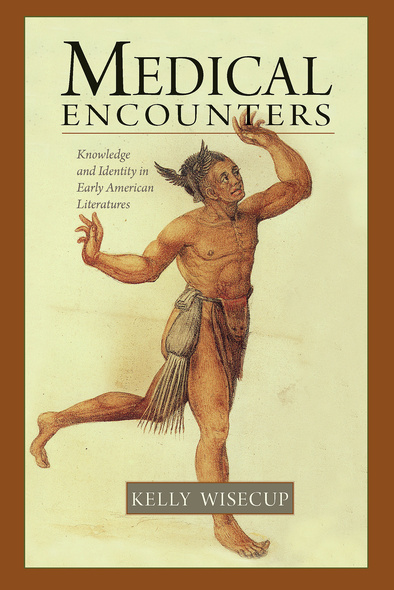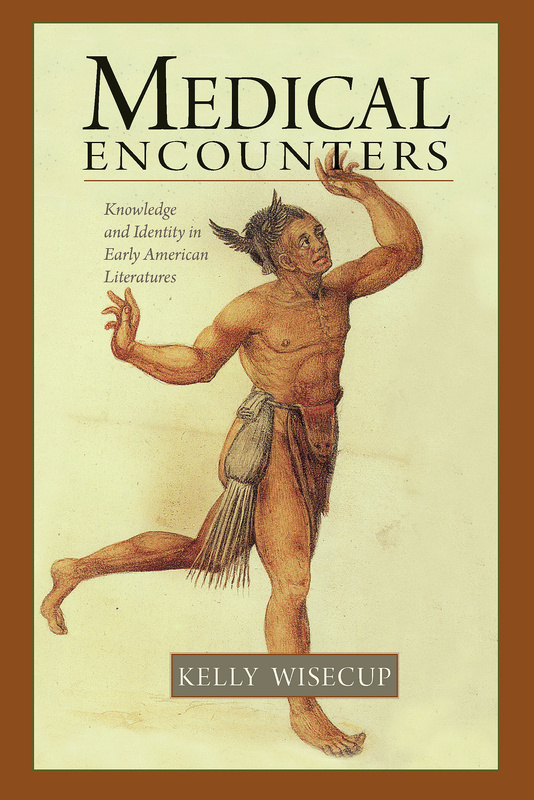Medical Encounters
Knowledge and Identity in Early American Literatures
University of Massachusetts Press
The conquest and colonization of the Americas resulted in all kinds of exchanges, including the transmission of diseases and the sharing of medicines to treat them. In this book, Kelly Wisecup examines how European settlers, Native Americans, and New World Africans communicated medical knowledge in early America, and how the colonists represented what they learned in their literatures.
Against the prevailing view that colonial texts provide insight only into their writers' perspectives, Wisecup demonstrates that Europeans, Natives, and Africans held certain medical ideas in common, including a conception of disease as both a spiritual and a physical entity, and a belief in the power of special rituals or prayers to restore health. As a consequence, medical knowledge and practices operated as a shared form of communication on which everyone drew in order to adapt to a world of devastating new maladies and unfamiliar cures.
By signaling one's relation to supernatural forces, to the natural world, and to other people, medicine became an effective means of communicating a variety of messages about power and identity as well as bodies and minds. Native Americans in Virginia and New England, for example, responded to the nearly simultaneous arrival of mysterious epidemics and peoples by incorporating colonists into explanations of disease, while British American colonists emphasized to their audiences back home the value of medical knowledge drawn from cross-cultural encounters in the New World.
Against the prevailing view that colonial texts provide insight only into their writers' perspectives, Wisecup demonstrates that Europeans, Natives, and Africans held certain medical ideas in common, including a conception of disease as both a spiritual and a physical entity, and a belief in the power of special rituals or prayers to restore health. As a consequence, medical knowledge and practices operated as a shared form of communication on which everyone drew in order to adapt to a world of devastating new maladies and unfamiliar cures.
By signaling one's relation to supernatural forces, to the natural world, and to other people, medicine became an effective means of communicating a variety of messages about power and identity as well as bodies and minds. Native Americans in Virginia and New England, for example, responded to the nearly simultaneous arrival of mysterious epidemics and peoples by incorporating colonists into explanations of disease, while British American colonists emphasized to their audiences back home the value of medical knowledge drawn from cross-cultural encounters in the New World.
An interesting, informative, and important book. Medical Encounters provides a new lens through which we can see moments of cultural encounter as rich with information about Native, African, and European beliefs and experiences.'—Kristina Bross, author of Dry Bones and Indian Sermons: Praying Indians in Colonial America
'Wisecup's book effectively advocates for medical literature as a rich repository for intercultural exchange and a locus for negotiating the structure of intercultural relations. Her texts disclose a wide-ranging epistemic network, just as they underscore the anxious and continuous work of colonist authors of medical literature to invest their writing with authority and mastery rather than evidence of spiritual, imaginative, and bodily corruption. . . . A clear attestation to the import of medical phenomena to understanding early America.'—The New England Quarterly
'Wisecup is at her best when underscoring the metaphysical connections among European, native, and African medical traditions. Recommended.'—Choice
'Medical Encounters is a provocative work that pushes scholars to take seriously the contributions of Natives and Africans in the production of knowledge and the development of medical practices in early British North America. . . . Wisecup shows the process by which colonial accounts wiped away African sources and hid African knowledge systems.'—William and Mary Quarterly
'Her explication of the shifting classifications of medical knowledge as religion, magic, and science will be of interest not only to early Americanists but also to historians of science and medicine.'—American Literature
Kelly Wisecup is assistant professor of English at the University of North Texas.





